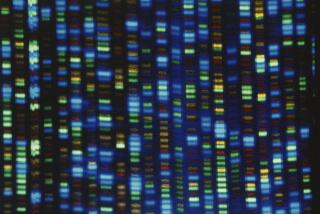Pentagon to Use Soldiers’ DNA to Identify Casualties
- Share via
WASHINGTON — A new genetic identification system for the military may mean that there will be no more American “unknown soldier” casualties in future wars.
The Defense Department announced Friday that it was authorizing the creation of a repository of biological samples, taken from blood and saliva of all armed service members, that could be used for identification purposes.
Army Maj. Victor Weedn, chief of the Armed Forces Institute of Pathology, said the samples will be placed on identification cards that will be stored in vacuum-sealed packages and then frozen.
Cells in the blood and saliva samples will contain the DNA pattern that is unique to each person. DNA, or deoxyribonucleic acid, contains a person’s genetic code and is present in each body cell.
By comparing the DNA from unidentified combat dead with the DNA from samples in the repository, the military should be able to positively identify the casualties.
The system also could be used to identify the dead in mass disasters, such as airplane crashes, when only partial remains are recovered, Weedn said.
“Identification of remains has long been a priority for the U.S. military,” he said in a statement. “The establishment of this repository may very well mean that we will no longer have an ‘unknown soldier’ from future battle casualties.”
DNA testing of the stored specimens will be conducted only for specific cases, and the genetic information will be treated with confidentiality, he said.
Weedn said DNA identification was used in Operation Desert Storm, but the system could have been more useful if there had been a repository of information on all military personnel.
The military has estimated that it will take about five years for specimens from all active duty personnel to be placed into the repository.
Two cards with specimens will be created for each service member, officials said. In addition, each card will include a fingerprint, a signature and a bar code to assure positive identification.
One card will be kept with medical records, and the other will be sealed and frozen.
Collection kits for the system will cost about $3 each, and long-term storage will cost an additional $2 to $3, officials said.
More to Read
Sign up for Essential California
The most important California stories and recommendations in your inbox every morning.
You may occasionally receive promotional content from the Los Angeles Times.












